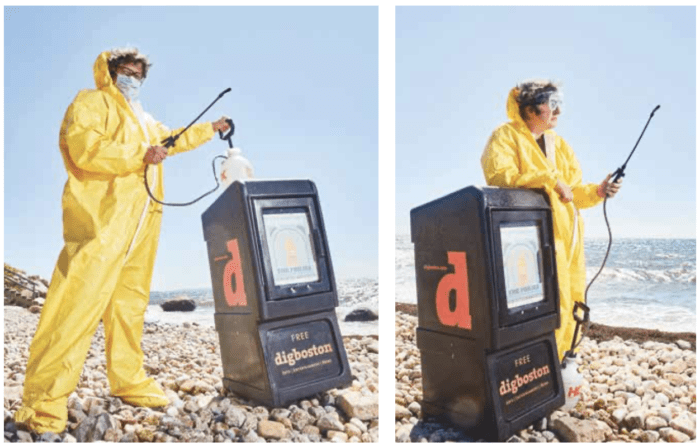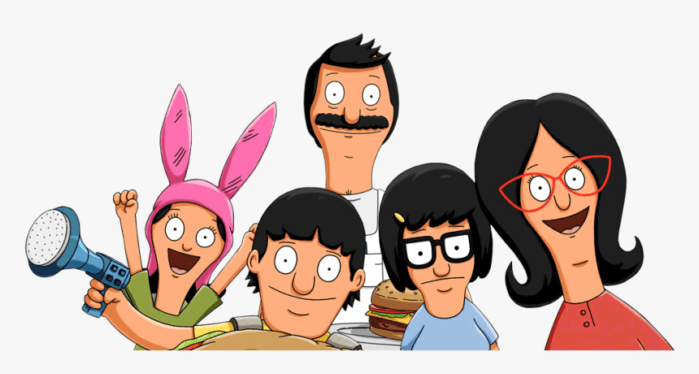
PHOTOS BY KELLY DAVIDSON
“Do we have an interview right now?”
I have Eugene Mirman on the line, and he’s correct. We’re supposed to chat.
“Think so.”
It’s the best I can come up with on the fly.
In my experience, most celebrities don’t ask such questions. They announce themselves, often through a publicist who tapped into the line like a federal agent, then yawn and muster enough energy to tolerate another round of interviews and irritating inquiries.
But not Mirman. Not at all.
Despite being one of the top pop culture players who lives in and reps Greater Boston, he’s consistently humble.
“I realized I forgot if somebody was calling me or not, but I can totally do it.”
 I’m grateful for the time. Beyond a regular check-in with Mirman to discuss his perspectives on topics from COVID to comedy, I also want to talk about how he has been extremely present and productive throughout the pandemic—even though he’s barely left his getaway on Cape Cod, where the Lexington native lives with his son Oliver when they’re not at their primary Somerville place.
I’m grateful for the time. Beyond a regular check-in with Mirman to discuss his perspectives on topics from COVID to comedy, I also want to talk about how he has been extremely present and productive throughout the pandemic—even though he’s barely left his getaway on Cape Cod, where the Lexington native lives with his son Oliver when they’re not at their primary Somerville place.
Since quarantine gutted the comedy economy, Mirman has recorded a PSA for the city of Boston; made the media rounds flanking his new documentary, It Started As a Joke; cameoed on a special for the Adult Swim show Delocated; held fundraisers on social media, including for Dana-Farber and the Comedy Studio; and, Bob’s Burgers lovers will be thrilled to learn, recorded the voice of gurgly pre-teen fartthrob Gene Belcher for an upcoming season of the indelible series.
Mirman’s also done a lot of live cooking on Facebook. But while his posts attract thousands of views, when I posit that there is a void in the comedy and bites matrix that he seamlessly straddles as a humorist who can tackle egg custard with shrimp, his response reveals that culinary stardom is hardly on the menu.
“I think Amy Shumer has a cooking show,” he says. It’s true, she does. Mirman continues, “I just enjoy cooking and food and restaurants. … I sort of always have liked cooking since I was a kid. … When we first moved here [to Cape Cod] it was clear that if I wanted a lot of the foods that I like, I was going to have to make them.”
I have followed Mirman’s Daily Quarantine Routines on Facebook for months. The bullet points are mostly food-related or funny—stuff like “Q&A Zoom with surviving members of Lynyrd Skynyrd, answering any social media questions they have.” But through the yolks and jokes, it’s clear that he is nevertheless occupied at a time when many creatives feel stifled. Considering his unbelievably distressing recent loss, it’s warming to see him stay so connected with his friends, family, and fans.
In January, before the complications that pair with pandemic parenting mounted, Mirman’s wife, home- and film set-decorator Katie Westfall Tharp, died after a bout with cancer. Their connection weaves through the heart of It Started As a Joke; the project is ostensibly about the Eugene Mirman Comedy Festival, which ran for a decade including for three years in Boston (2013-2015), but actually revolves around a constellation of talent and admiration for a guy who puts good into the world and whose chums—and especially the love of his life—adore him in return. As buddy Bobcat Goldthwait says in the doc, Mirman is like a “drain in the sink that catches all the weirdos.” Katie was the biggest catch of all, and with her struggle buttressing the story arc, It Started As a Joke features the saddest ending imaginable.
“In some ways it was surreal.” Mirman recalls getting hit with a pandemic on top of his major loss and grieving through Zoom on a virtual press run. “In one sense, it was nice to get to talk about Katie and have something to do. It was in another sense strange to be promoting something, but it was nice to have some normalcy and a small schedule.
“Me and Julie [Smith Clem], who directed the movie and produced the festival, had always talked about making some sort of documentary or special about it. Also, there was a part of it that was making a movie about my wife, for my son so he could have it when he grows up.”
As Westfall Tharp tells the camera, up until the point that they began recording the film, Mirman hadn’t written or performed much personal material. There’s the “full-hearted 45-minute cry-a-thon” on his epic 2015 7-LP comedy album, I’m Sorry (You’re Welcome), and an occasional joke about coming of age with ethnic Russian parents in the ’80s, but for the most part, Mirman is a watcher.
“A lot of my stuff is the result of something I see or that happens in my life, but it’s true that it isn’t exactly personal,” he says. “By that time, so much of what was happening in our lives was finding ways to live and have happy moments and do things, but the circumstances of moving [to Massachusetts from Brooklyn] did have to partially do with cancer. And it was an element of why it didn’t make sense to keep doing the festival.”
Now that everyone is sharing a tragedy, at least in some regards, Mirman has emerged as a model of sorts for how to maturely manage potential boredom and personal misery out in the open—while still being hilarious. You might even say he was prepared for the pandemic, tagline and all; as he said on Late Night with Conan O’Brien in 2004, “I have a thing that I say when people cough. Stop it!”
Describing his daily news consumption, Mirman says, “I try to stay informed about all the terrible things that are happening, but not over and over, because I find that it’s upsetting. … Everything that is dumb that the president says reaches me, but not eight times. I’d say more like one to three times.”
From his Daily Quarantine Routines, it’s easy to see where Mirman stands on issues. On April 18, his 8 am agenda item was “Drive to a beach and place people too close to others under citizen’s arrest.”
“It’s insane that there is any controversy over wearing masks,” he says. “It’s deranged. Look, if you’re walking past people, put on a mask. The idea that only you fully understand this disease and are going to sit on a crowded beach next to someone with no mask—I don’t get that.”
The satirical daily to-do lists also reflect his level of confidence in the response to the virus; Mirman’s task for 9 am on June 17 was “Order 100 at-home Covid tests that are obviously just packets of mayonnaise.” The following month, his son had an actual, nonmayo COVID test. The results took nine days, though, so you never really know what it was made of.
“That is such a failure of American government,” he says. It’s the only moment in our chat when he even approaches anger. “How about he gets the results in 15 minutes, and then people can go into places?”

Mirman’s not the type to shitmouth maskholes in an interview. He’ll blow some highbrow snubs their way instead, maybe in his next daily routine, in the form of a post or appearance on a friend’s virtual special. But for all his busyness livecasting and assisting charity events, he hasn’t done any traditional stand-up sets, in-person or virtually, and won’t be anytime soon.
“I know there are outdoor shows,” Mirman says. “That may or may not be safe.” Virtually speaking, he adds, “I am very happy to do something that I think makes sense for the medium, like live Q&As. I think if I thought this was a permanent state, and the only way we could do stand-up ever again would potentially be these virtual things, then I’d be more likely. … If I thought I could do a thing well, I would do it, but trying new jokes virtually would not provide me probably with the feedback I need to know if a thing is good.”
In the meantime, burger scripts need to be flipped.
“All cartoons except Bob’s record with just you on with a director saying your lines,” he explains. “Bob’s we record [at the same time] in [multiple] cities on an [ISDN] line, like we’re recording together, and that way we do get to improvise. We do the scenes as written, and then people throw out suggestions and stuff like that.
“During the pandemic, we’ve recorded some from our home. … The production team figured out how to move forward. It’s actually quite doable. … In the first days of quarantine, they moved all of the audio, video, and animation into the homes of Bob’s team members to continue production. … I think the sound is pretty good, but whether we rerecord in a studio I don’t know.”
As for returning to Somerville, where he just finished a long renovation…
“I do miss the camaraderie of restaurants as a gathering place and a place to meet up,” he says. “A lot of local places like Spoke [Wine Bar]—I really miss going there. The pandemic is a sad, surreal thing.
“I’d love to do another special, but it would mean that I would have to practice stand-up in a place,” he says. “We’ll see how things progress. We’ll see if there’s a vaccine.”
A Queens, NY native who came to New England in 2004 to earn his MA in journalism at Boston University, Chris Faraone is the editor and co-publisher of DigBoston and a co-founder of the Boston Institute for Nonprofit Journalism. He has published several books including 99 Nights with the 99 Percent, and has written liner notes for hip-hop gods including Cypress Hill, Pete Rock, Nas, and various members of the Wu-Tang Clan.

